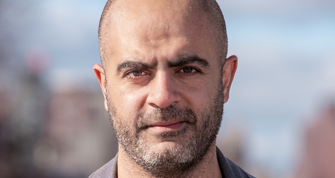Explore upcoming events

Hailed as “an important new novel, not-to-be-missed” by Joyce Carol Oates, Amir Ahmadi Arian’s debut Then the Fish Swallowed Him is a powerful portrait of living through the despotism of modern-day Iran that exposes the corrosive power of the state to bend individual lives. Since leaving Iran in 2011, Amir completed a PhD in Brisbane and has translated novels by E.L Doctorow, Paul Auster, P.D. James, and Cormac McCarthy from English to Farsi. We asked Amir about the inspiration behind his novel and how his fiction and non-fiction works inform each other.
Then the Fish Swallowed Him follows Yunus Turabi, a bus driver in Tehran, who after being involved in a bus drivers’ union strike is taken to the infamous Evin prison for political dissidents. Yunus is in solitary confinement for much of the book – did this setting open up unique opportunities in how you were able to tell the story?
This setting both posed an enormous challenge and opened up new opportunities. For writing this book I read many novels set in prison worldwide, and I noticed that very few of them focus on solitary confinement. And for a reason – a person trapped alone in a room is a nightmare for a novelist. There’s no possibility of dialogue, action or any form of interaction. You only have the character’s state of mind to work with, which is very limiting. So it was a unique opportunity for me in the sense that this subject hasn’t really been explored before, but also a great challenge because, as a novelist, you are deprived of your main tools.
In your acknowledgements you thank the bus drivers you spoke to about the history of the union, as well as a number of people who spent time in solitary confinement. What were those conversations like, and did these lived experiences put pressure on what you felt had to be included in the story?
I used to live in north west of Tehran by the mountains near the end of a bus line. I usually approached the drivers after work at night, when they were having dinner in their idle buses or sitting on the curb smoking before heading home. They encounter thousands of people every day and constantly find themselves in small-talk situations, so it wasn’t hard to get them to talk. I didn’t feel pressured about including or excluding a lived experience. I was writing a novel after all, and I wasn’t committed to facts.
Before coming to fiction, you worked as a journalist. What does writing fiction about political upheaval allow you to do that non-fiction may not have?
I wrote fiction while doing journalism. It was not a separate period in my life. The intellectual climate in Iran is quite different from the West, in that the lines that separate genres are much more blurred. It’s very common to do journalism, write fiction, plays, poetry, and literary criticism at the same time. To answer to your question, I paraphrase what E.L. Doctorow said about the difference between novel and history: journalists tell you what happened, novelists tell you what it felt like.
Much of the story centres around Yunus’ relationship with his interrogator, Hajj Saeed, who is a chilling interrogator but still very much a human character rather than a one-dimensional ‘evil villain’. What was it like writing the relationship between these two men?
For that part I talked to quite a few people who had a similar experience. I didn’t directly use their testimonies, but from those conversations I learned a lot about that dynamic, what happens in the mind of an Evin interrogator, how they scrutinize your past to find points of weakness and use them to undermine your will, how they repeat the same question in different contexts to make you contradict yourself. I teased out the bare bones of an interrogation procedure in Evin, then added imagined flesh and blood on it.
You have also translated from English to Farsi novels by E.L Doctorow, Paul Auster, P.D. James, and Cormac McCarthy. Do you feel your work in translation influences your own writing?
It absolutely did. When you translate a novel as a novelist, apart from the linguistic choices you make which later come to your help in your own work, you practically reverse-engineer someone else’s novel. In translation you learn so much about how a book is constructed and pay attention to things you never notice as a reader.